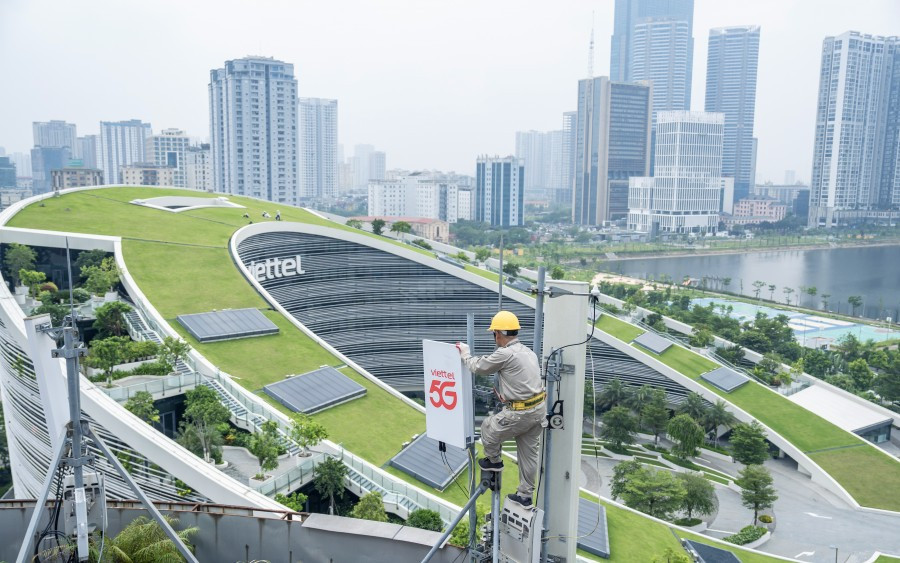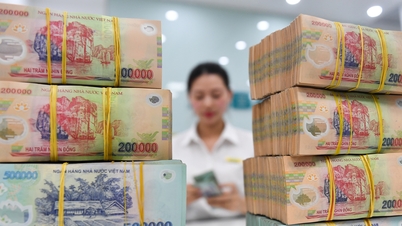After more than a week of commercializing 5G in Vietnam, Viettel network has recorded a number of cases where users reported that their devices were hot, unable to access the network, or that the 5G network speed was slow.
According to Mr. Hoang Duc Thanh, a radio architect at Viettel Network Corporation, during the recent monitoring process, the company received feedback from a number of customers about experiencing slow 5G speeds, only equivalent to 4G.
Explaining this situation, Viettel experts said that because 5G is a newly deployed service, currently concentrated in some large urban areas, the number of 5G stations is not as many as 4G, in addition to the psychology of users "eagerly" checking the speed.
According to Mr. Thanh, the speed of 5G service experience depends on factors such as the user's location near or far from the station, strong or weak signal, where the routing server is located. "During low-load hours, with one subscriber's experience, a speed of 300-400 Mbps can be achieved," said a Viettel expert. Therefore, when many people access 5G at the same time, it will lead to a situation where some subscribers are allocated more resources than others.

The fact that many subscribers use software to test 5G network speed at the same time also reduces the overall performance of the system. This situation will improve in the near future when the service is popularized, the number of subscribers checking will decrease.
Agreeing with the above statement, Ms. Nguyen Thi Tam, Deputy General Director of Viettel Network Corporation, said that currently there are two popular speed testing software, SpeedTest and iSpeed of the Ministry of Information and Communications . Both of these applications use many random servers for testing, so in case the algorithm gives a "bad" server (old configuration), it will also lead to a decrease in the measured results.
Meanwhile, the current 5G network capacity is enough to provide services to a large number of subscribers with daily data needs.
“Unlike using speed testing software that requires maximum network resources to get the best results, daily tasks such as watching YouTube and streaming in FullHD resolution only require a speed of 5-7 Mbps ,” said Ms. Tam.
Regarding the situation of some subscribers reporting that the device gets hotter and consumes more battery when using 5G service, Mr. Hoang Duc Thanh said that new technologies with higher speeds require higher processing capacity of the device (technically and with wider bandwidth), leading to higher power consumption on the device. For example, the 5G broadcast bandwidth is 100 MHz, 5 times higher than 4G technology, which also requires the device to handle more complex terminals.
Viettel network representative assessed that 5G technology will make the device consume about 5-10% more battery than 4G.
In addition, Viettel network also received feedback about some subscribers not being able to access 5G services. According to the share, currently the number of devices that cannot access Viettel's 5G network are hand-carried phones, locked versions for each specific market that do not support SIM cards, while international hand-carried smartphones can still use the service normally.
To solve problems such as overheating or fast battery drain, Viettel representative informed that users can use the available configuration modes on the device such as 5G On (always turn on 5G) or only turn on 5G when there is a need to download large data, background applications only need 4G to meet the needs. In addition, when registering to use 5G service, you can ask the support staff to see if the device is compatible or not.
In the coming time, this network operator will continue to coordinate with terminal manufacturers to use a unified reference set to optimize performance for users.
Through system monitoring, Viettel representatives said that 5G network traffic has increased rapidly over the past ten days. Nationwide, 5G traffic is only 5% of 4G, but if we consider only urban areas where new services have been deployed, 5G traffic has nearly reached 15%.

Source: https://vietnamnet.vn/nguyen-nhan-may-nong-toc-do-truy-cap-mang-5g-cham-2335199.html














































































































Comment (0)